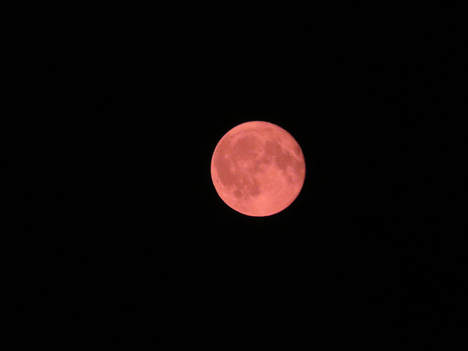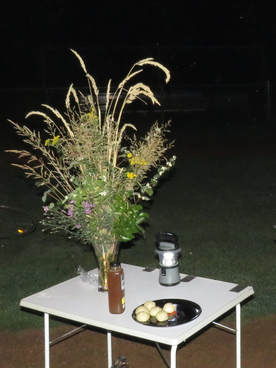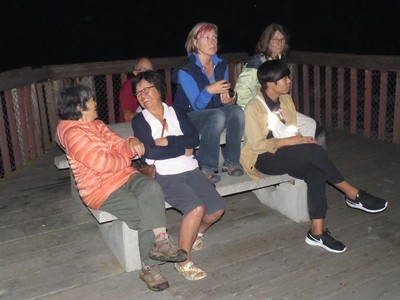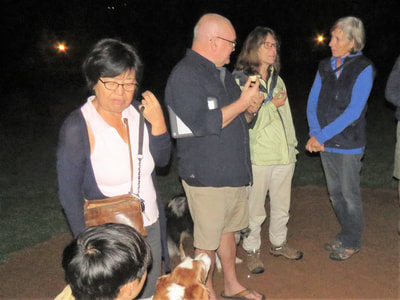Otsukimi 2017
On the occasion of the September meigetsu (harvest moon) a band of friendship society ‘wanderers’ met at Lakeside Park Nelson, for otsukimi (moon viewing), haiku reading and manju (what, no sake?)
Traditionally, otsukimi is held on the fifteenth night (Jugo Ya) of the eighth month of the lunar calendar.
Dating back to 1100 years ago, and influenced by Chinese culture, the court people had a moon viewing party with poem readings, playing music, and also enjoying sake. You would find many stories of this event in old collections of tanka poems, diaries and/or famous tales such as The Tale of Genji or The Tales of the Bamboo Cutter-the Princess Kaguya.
By the time of the Edo period, about 350 years ago, commoners also had a moon viewing party to celebrate and thank nature for their harvest. It became very popular among poets to have gatherings or contests for haiku reading under the harvest moon. This custom is still popular today in Japan.
Several members of the group read haiku in Japanese and English:
This haiku, written by Matsuo Basho (1644-1694), was read by John:
Jou akete Please unlock the door
tsuki sashiireyo let the moon into
Ukimidou the Ukimidou on the lake
(Ukimidou is a small temple on Lake Biwa.)
Basho is the renowned haiku poet of the Edo period who in later life became a wanderer most notably in the ‘north’ of Honshu.
This Basho haiku, taken from oku no hoso michi (The narrow road to the deep north), was read by Malcolm:
“The changeable sky
of the northern districts
prevented me from seeing
the full moon of autumn”
We were concerned that the smoke in the skies from the wildfires would prevent us from seeing the full moon. We waited anxiously.
Shoko wrote these haiku:
Meigetsu ya The full moon night
shitashiku tsudoi friends are gathering
uta o yomu reading haiku poems
Meigetsu ya The beautiful moon
reikusaido no standing beside the lake
kaze suzushi cool breeze around
(Kaze suzushi → kaze kemushi → smoky breeze around)
This haiku was written by Jim Sawada in memory of a lost friend:
“Meigetsuya Harvest moon
Tomo ni sasageru white chrysanthemum in a vase
Shiroi kiku” for the friend I lost
Grace Deveau read a haiku written for the occasion:
“Eagerly we wait
Moon rises through smoky skies
Dry dusty harvest.”
New member Richard read a haiku that he wrote just before the gathering:
"Brushstrokes of smoke
obscure memories
shy moon hides"
Keiko and John independently chose this popular haiku, from Ransetsu Hattori (1654-1707):
Meigetsuya Under the harvest moon
Kemuri hai iku Smoke drifts
Mizu no ue across the lake
On the occasion of the September meigetsu (harvest moon) a band of friendship society ‘wanderers’ met at Lakeside Park Nelson, for otsukimi (moon viewing), haiku reading and manju (what, no sake?)
Traditionally, otsukimi is held on the fifteenth night (Jugo Ya) of the eighth month of the lunar calendar.
Dating back to 1100 years ago, and influenced by Chinese culture, the court people had a moon viewing party with poem readings, playing music, and also enjoying sake. You would find many stories of this event in old collections of tanka poems, diaries and/or famous tales such as The Tale of Genji or The Tales of the Bamboo Cutter-the Princess Kaguya.
By the time of the Edo period, about 350 years ago, commoners also had a moon viewing party to celebrate and thank nature for their harvest. It became very popular among poets to have gatherings or contests for haiku reading under the harvest moon. This custom is still popular today in Japan.
Several members of the group read haiku in Japanese and English:
This haiku, written by Matsuo Basho (1644-1694), was read by John:
Jou akete Please unlock the door
tsuki sashiireyo let the moon into
Ukimidou the Ukimidou on the lake
(Ukimidou is a small temple on Lake Biwa.)
Basho is the renowned haiku poet of the Edo period who in later life became a wanderer most notably in the ‘north’ of Honshu.
This Basho haiku, taken from oku no hoso michi (The narrow road to the deep north), was read by Malcolm:
“The changeable sky
of the northern districts
prevented me from seeing
the full moon of autumn”
We were concerned that the smoke in the skies from the wildfires would prevent us from seeing the full moon. We waited anxiously.
Shoko wrote these haiku:
Meigetsu ya The full moon night
shitashiku tsudoi friends are gathering
uta o yomu reading haiku poems
Meigetsu ya The beautiful moon
reikusaido no standing beside the lake
kaze suzushi cool breeze around
(Kaze suzushi → kaze kemushi → smoky breeze around)
This haiku was written by Jim Sawada in memory of a lost friend:
“Meigetsuya Harvest moon
Tomo ni sasageru white chrysanthemum in a vase
Shiroi kiku” for the friend I lost
Grace Deveau read a haiku written for the occasion:
“Eagerly we wait
Moon rises through smoky skies
Dry dusty harvest.”
New member Richard read a haiku that he wrote just before the gathering:
"Brushstrokes of smoke
obscure memories
shy moon hides"
Keiko and John independently chose this popular haiku, from Ransetsu Hattori (1654-1707):
Meigetsuya Under the harvest moon
Kemuri hai iku Smoke drifts
Mizu no ue across the lake
Keiko made the traditional arrangement of 7 types of wild plants, and manju, a Japanese confection of rice flour and adzuki beans. Manju look like the moon, and there must be exactly 15 of them! We ate manju as we waited for the moon to rise over the mountains to the south of Nelson.
Suddenly the top of the moon appeared. In minutes we viewed the full bright-red harvest moon.
Keiko made the traditional arrangement of 7 types of wild plants, and manju, a Japanese confection of rice flour and adzuki beans. Manju look like the moon, and there must be exactly 15 of them! We ate manju as we waited for the moon to rise over the mountains to the south of Nelson.
Suddenly the top of the moon appeared. In minutes we viewed the full bright-red harvest moon.
Historical notes from Shoko Kurizaki Armstrong. Malcolm Fitz-Earle photos.





